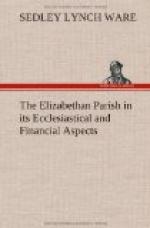The act-books abundantly show that ecclesiastical courts were very far from being limited to mere moral suasion or to spiritual censures. They could never have accomplished their work so thoroughly if they had been. This point will be brought out much more clearly, it is hoped, when we come to consider excommunication as a weapon of coercion.[38] The courts fined parishioners individually[39] and they fined them collectively. What matters it that these fines were called court fees, absolution fees, commutation of penance, or by any other name? What signifies it that the proceeds could be applied only in pios usus? The mulcting was none the less real. On the score of bringing stubborn or careless wardens to terms through their purses, the following extract from a letter written in 1572 to the official of the archdeacon of the bishop of London is in point. The letter informs the judge that Jasper Anderkyn, a churchwarden, “hathe done nothing of that which he was apoinnted by your worshipp at Mydsomer to do, for the churche yarde lyeth to commons and all other thynkes in the churche is ondonne.... I praye you dele w[i]t[h] hym so yt he maye be a presydent for them that shall have the offyce; for they wyll but jess att itt, and saye it is butt a mony matter: therefore lett them paye well for the penaltie whiche was sett on theire heads.” Continuing, the writer states that his reason for writing is “that you be not abewseid in youre office by there muche intreatyng for themselffes, for Jesper Anderkyn stands excommunicated."[40]
Sometimes for failure to perform the ordinary’s[41] injunctions a whole parish was excommunicated or a church interdicted.[42] Thus in the Abbey Parish Church[43] Accounts we read under the year 1592 how troublesome and how costly it was “when the church was interdicted” to ride to Lichfield and there tarry several days seeking absolution. For this 20 shillings was paid, a very large sum for the time, not to mention a fee to the summoner, travelling expenses and the writing of letters on the parish’s behalf.[44] The wardens of Stratton, Cornwall, had a similar experience “when the churche wardyns & the hole p[ar]ysch was exco[mu]nycatt” in 1565. Among the expense items relating to that occasion is a significant one: “ffor wyne & goodchere ffor the buschuppe ys s[er]vantt[s] ij s. viij d."[45]
So close is the supervision of the ordinary over the churchwardens, so effective the discipline of the church courts, that we seem to hear occasionally a sort of dialogue going on between judges and wardens, the former directing certain things to be executed, the latter replying and reporting from time to time that progress is being made on the work to be performed, or that the missing objects will be soon supplied. Accordingly, at the archdeacon of Canterbury’s visitation in 1595, we find the wardens of St. John in Thanet (Margate) reporting: “The chancel[46] is out of repairs, for the repairing whereof some things are provided."[47] Two years later they state to the court: “For repairing of the churchyard we desire a day."[48] At the same visitation the wardens of St. Lawrence in Thanet (Ramsgate) present: “Our Church is repaired, saving that some glass by reason of the last wind be broken, the which are [sic] shortly to be amended."[49]




